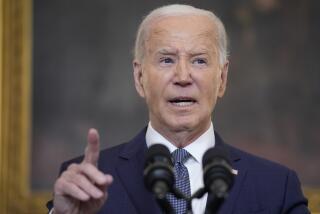Baker Gives New Bush Peace Proposal to Syria : Mideast: Neither side will disclose contents of President’s letter. But it reportedly concerns conditions for a regional conference.
- Share via
LISBON — Secretary of State James A. Baker III on Saturday gave Syria a new U.S. proposal for the shape of an Arab-Israeli peace conference, marking a new attempt by the Bush Administration to revive its stalled Middle East peace initiative.
Baker handed a letter from President Bush to Syrian Foreign Minister Farouk Shareh and asked him to carry the message to Syrian President Hafez Assad.
Baker, who met with Shareh for two hours at a hotel here, said it was “a detailed letter” that he wanted to outline to Shareh “face-to-face.”
Baker and Shareh refused to disclose the substance of the letter or their discussions.
But when asked if the letter was a direct invitation to Assad to attend a peace conference convened by the United States and the Soviet Union--a unilateral move that some have proposed as a way to break the procedural logjam--Baker smiled and said, “It is not an invitation.”
Shareh said the hastily arranged meeting was “very useful.” Asked whether it restarted progress toward peace negotiations, he said, “I hope so.”
A U.S. official said the letter centered on the procedures and conditions under which a peace conference could take place--in effect, another attempt to break the impasse between Israel and Syria.
After four punishing journeys through the Middle East, Baker has gathered polite expressions of encouragement from the area’s long-warring nations but no substantive concessions.
Israel and its Arab neighbors remain far apart on the substance of most peace proposals: the idea that Israel should withdraw from much of the West Bank, Gaza Strip and Golan Heights--Arab territories it captured in the 1967 Six-Day War--in exchange for genuine peace with Syria, Jordan and other Arab countries.
Bush and Baker hoped to make progress on that question by convening a peace conference under U.S. and Soviet sponsorship. But Israel and Syria have been haggling determinedly over the nature, length and even title of such a meeting.
Syria wants the conference to be held under U.N. auspices, primarily because the U.N. Security Council has repeatedly called for Israeli withdrawal from the occupied territories. Assad’s regime also wants the conference to remain in session as long as possible, presumably to keep pressure on Israel for concessions.
For the same reasons, Israel wants the United Nations restricted to little or no role and wants a conference that would meet only once, never to appear again.
Baker envisions a conference with Israel, Syria, Egypt and a joint Jordanian-Palestinian delegation as full participants, with the secretary general of the six-nation Gulf Cooperation Council sitting in as an observer. So far, Egypt is the only country to make an unequivocal commitment to attend.
Soviet Foreign Minister Alexander A. Bessmertnykh, who met with Baker earlier Saturday, said the Soviet Union is also stepping up its participation in the negotiating effort.
“It’s really a very intensive effort, and we are very much in it,” he said.
“We are . . . somewhat hopeful. Maybe not confident. But we are trying,” Bessmertnykh said.
Times staff writer Norman Kempster, in Washington, contributed to this story.
More to Read
Sign up for Essential California
The most important California stories and recommendations in your inbox every morning.
You may occasionally receive promotional content from the Los Angeles Times.











